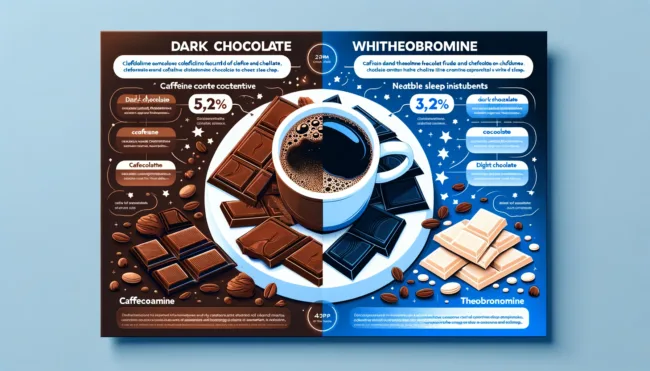How chocolate affects your sleep: The roles of caffeine and theobromine explained
Chocolate, a beloved treat worldwide, not only satisfies the taste buds but also impacts bodily functions in less obvious ways. While its delightful taste can lift the spirits, it’s crucial to understand the lesser-known effects of chocolate’s ingredients, particularly when consumed before bedtime. This comprehensive analysis explores how specific components in chocolate, namely caffeine and theobromine, can disrupt sleep patterns, offering insights for those seeking a good night’s rest.
Understanding caffeine in chocolate
Caffeine, widely recognized for its stimulating effects, is present in all varieties of chocolate to varying degrees. It is a natural stimulant found in cocoa beans, and its concentration in chocolate products depends on the cocoa content. Dark chocolate, known for its rich flavor and high cocoa content, contains significant amounts of caffeine. For instance, a standard bar of dark chocolate can have up to 30 mg of caffeine, roughly equivalent to a cup of instant tea. This amount can significantly influence sleep latency and quality, particularly for individuals sensitive to caffeine.

How chocolate affects your sleep: The roles of caffeine and theobromine explained
The role of theobromine in chocolate
Theobromine, another significant component found in chocolate, is a mild stimulant with effects similar to caffeine but less potent. However, it has a longer half-life in the human body, meaning its effects can last longer, potentially affecting sleep cycles. Theobromine primarily increases heart rate and can also lead to sleep disturbances by reducing the ability to fall asleep. Its presence is more pronounced in dark chocolate, making this variety more likely to impact sleep.
Comparing the effects of different chocolate types
While dark chocolate contains both caffeine and theobromine in notable amounts, white chocolate presents a lesser concern regarding sleep disruption. White chocolate typically contains minimal amounts of these compounds, making it a safer choice for late-night indulgence. However, for individuals particularly sensitive to stimulants, even the small amounts in white chocolate could be impactful.
Practical advice on chocolate consumption and sleep health
For those who enjoy chocolate and also value their sleep, the timing of chocolate consumption is crucial. Avoiding chocolate, especially dark varieties, in the hours leading up to bedtime can significantly improve sleep quality. This advice extends to other caffeine-containing products such as coffee and tea, which are well-known for their stimulative properties. Opting for non-caffeinated or herbal alternatives in the evening can help ensure that caffeine and theobromine do not interfere with sleep.
Balancing enjoyment and well-being
While chocolate remains a popular and delightful treat, awareness of its ingredients and their effects on sleep is essential for maintaining good health. By understanding the roles of caffeine and theobromine, chocolate lovers can make informed decisions about when to indulge in this treat to avoid sleepless nights. The key is moderation and timing, ensuring that chocolate remains a pleasure without compromising sleep quality.
Incorporating this information into daily routines can help individuals enjoy chocolate responsibly while protecting their sleep quality and overall health.
Discover more from Business-News-Today.com
Subscribe to get the latest posts sent to your email.

